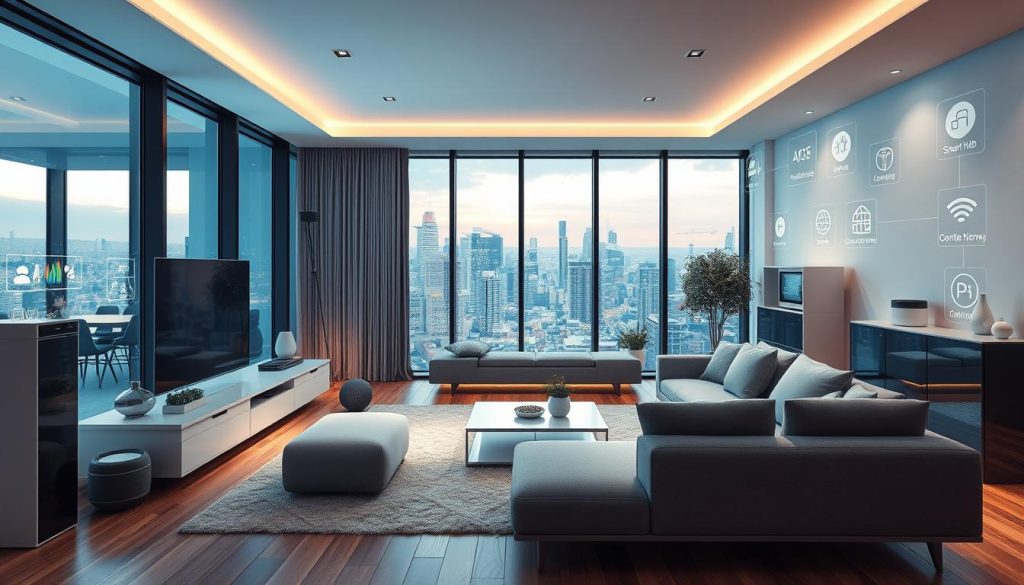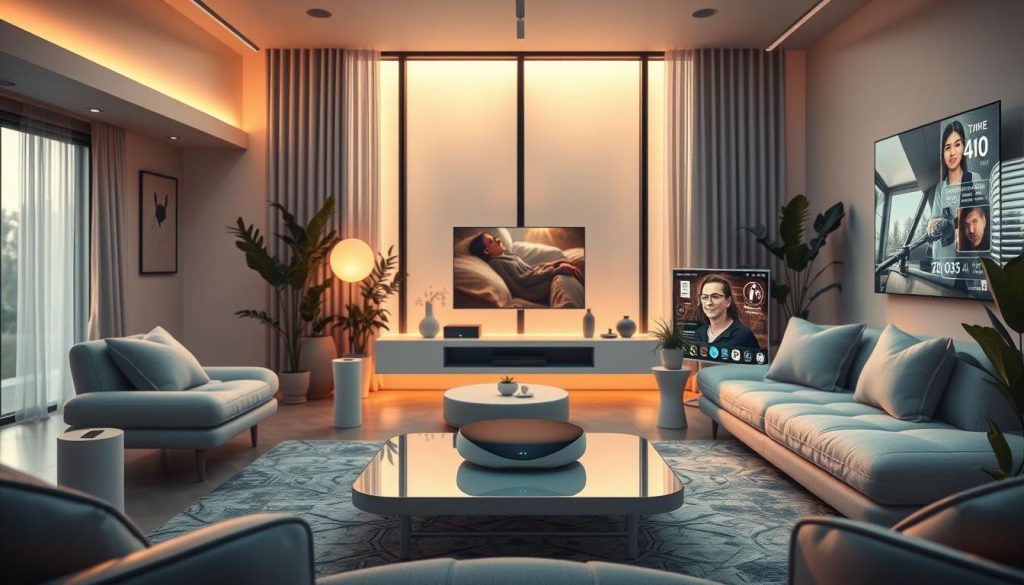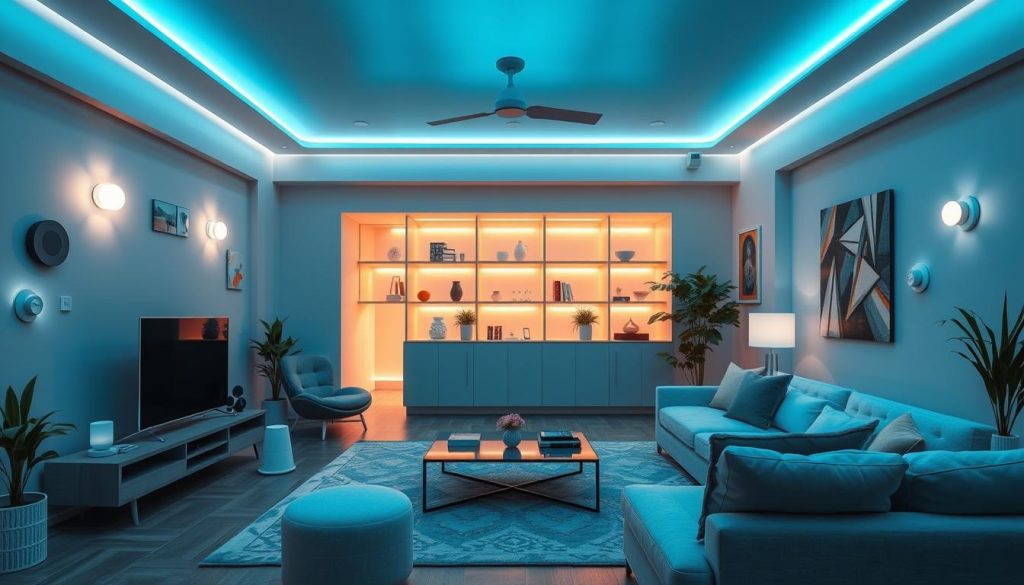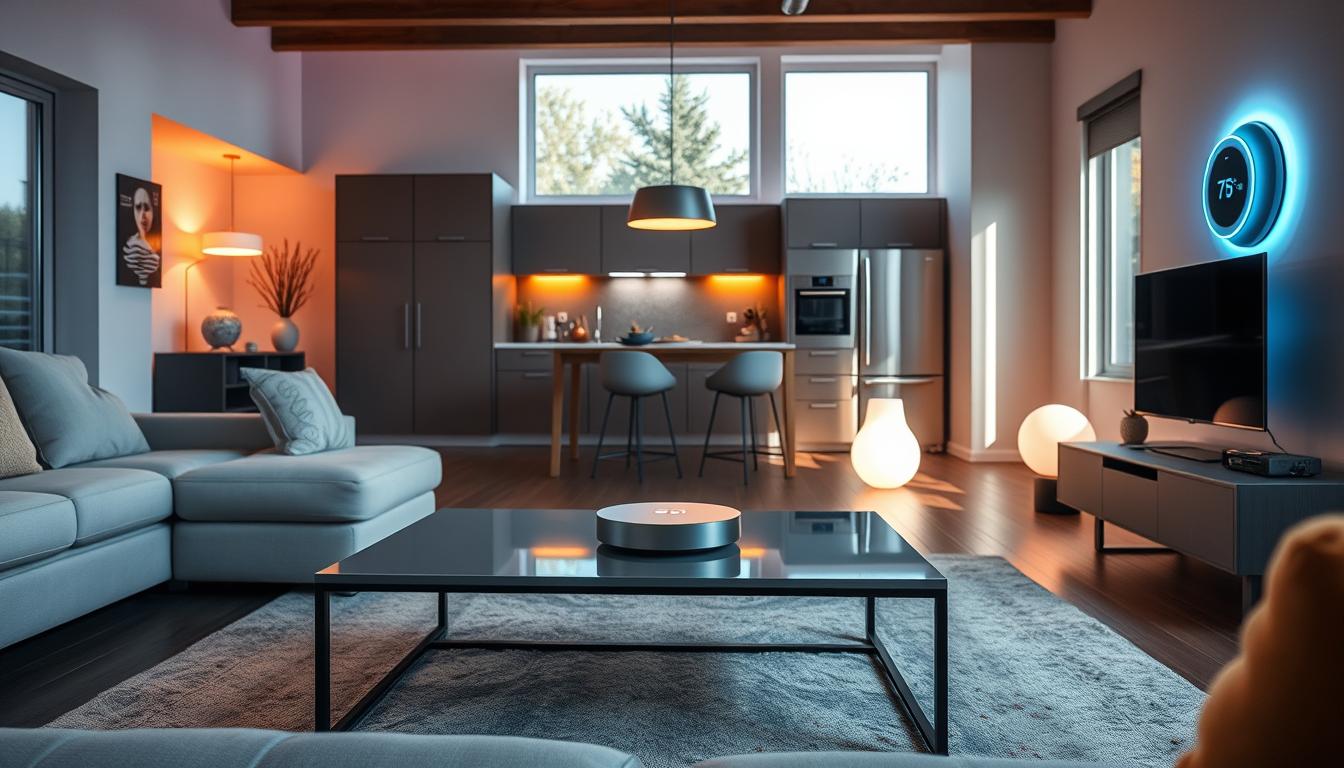I’m excited to share my knowledge on creating a connected and convenient living space. As a homeowner, I’ve seen how a smart home controller makes life easier. This guide will show you the importance of a smart home automation hub and how it can improve your living experience.
Smart home technology is becoming more popular, and many homeowners are upgrading their homes. I’ll give you an overview of what to expect from this guide. You’ll learn about choosing the right smart home hub, setting up devices, and solving common problems. We’ll explore the world of Smart Home Hubs & Ecosystems and smart home automation hub together.
Understanding Smart Home Hubs
Smart home hubs are key to a smooth smart home setup. They connect different devices, letting them talk to each other easily. The top smart home hubs make it simple to manage and watch your devices from one place.
There are many smart home hubs to choose from. Some come with cool features like voice control and automatic scene settings. Think about what devices you want to link and how much control you need. The aim is to pick a hub that makes your smart home life easier and more efficient.
- Enhanced device control and automation
- Seamless integration with various smart devices
- Improved home security and monitoring
Getting a top smart home hub means a more connected and easy living space. As you dive into smart home tech, think about what you need and want. This will help you find the best hub for your home.
Benefits of Using a Smart Home Hub
Using a smart home hub makes managing your home easier. It acts as a central control system and automates tasks. With top smart home ecosystems, you can control many devices from one place. This makes home management simpler.
Smart home technology solutions bring convenience, control, and better automation. These benefits make your life easier and your home more comfortable.
Convenience and Control
One big advantage of a smart home hub is its convenience. It lets you control lights, thermostats, security cameras, and more from one spot. This makes managing your home easy, even when you’re not there.
For example, you can turn off lights or change the thermostat from your phone or voice assistant. This is super handy.
Enhanced Automation
Smart home hubs also boost automation. They let you set up custom automations, like turning lights on when you enter a room. Or locking doors when you leave.
This makes life easier and improves your home’s security and energy use. It’s a win-win.
- Convenience and control
- Enhanced automation
- Improved home security
- Energy efficiency
By using a smart home hub, you get these benefits and more. It makes your life simpler and your home more comfortable.
Popular Smart Home Hubs on the Market
Choosing the right smart home automation hub is key for a seamless experience. With many options, picking the best one can be tough. Here, we’ll look at some top smart home hubs, their features, and what devices they work with.
Some of the top contenders in the smart home hub market include:
- Amazon Echo Plus: Known for its voice assistant capabilities and compatibility with a wide range of smart devices.
- Google Nest Hub: Offers a user-friendly interface and seamless integration with other Google devices.
- Samsung SmartThings: Provides a comprehensive smart home automation hub with advanced features and device compatibility.
These hubs offer features like voice control and easy device integration. They make managing your smart home easier. By picking the right hub, you can enjoy a more convenient and connected home.
When picking a smart home automation hub, think about compatibility, user interface, and features. This helps create a smart home that fits your needs and makes your life better.
| Smart Home Hub | Features | Compatibility |
|---|---|---|
| Amazon Echo Plus | Voice assistant, smart home automation | Wide range of smart devices |
| Google Nest Hub | User-friendly interface, smart home automation | Google devices, select smart devices |
| Samsung SmartThings | Comprehensive smart home automation, advanced features | Wide range of smart devices |
The Role of Ecosystems in Smart Homes
Exploring smart home technology, I see how vital smart home ecosystems are. They make our homes more convenient and automated. Experts say these ecosystems link devices and systems for better control and ease.
Smart home ecosystems are key in smart home tech. They let devices talk to each other smoothly. This is thanks to smart home hubs, the system’s brain.
What is a Smart Home Ecosystem?
A smart home ecosystem is a network of devices and systems. It includes things like thermostats, lights, and security cameras. All these are connected to a central hub.
Key Components of an Ecosystem
The main parts of a smart home ecosystem are:
- Devices: Like thermostats, lights, and cameras
- Hubs: The system’s brain
- Software: For devices to communicate and work together
Understanding ecosystems in smart homes shows their importance. They make our living spaces more convenient and automated.

Choosing the Right Smart Home Hub
When picking the best smart home hubs, think about a few key things. The hub should work well with your devices. It should also have an easy-to-use interface and useful features.
Compatibility with Devices
Check if the hub works with the devices you have. Look for hubs that can connect to many devices, like lights, thermostats, and security systems. This makes it simple to control everything from one place.
User Interface Considerations
A good hub has an interface that’s easy to use. It should let you control devices, set routines, and see what’s happening in your home. Some hubs even let you control your home with your voice.
Budget and Features
Think about how much you want to spend and what features you need. Some hubs have cool features like automating tasks, tracking energy use, and working with other smart devices. Pick a hub that fits your budget and needs for a smooth smart home experience.
Integrating Smart Home Devices
Exploring smart home technology shows how key it is to link different devices with a central hub. This setup lets devices talk to each other smoothly, making home control easier. It turns my home into a more convenient, automated space.
Experts say linking smart devices like lights, thermostats, and security systems boosts the smart home vibe. By hooking these up to a central hub, I can manage them all from one place. This makes life simpler and adds to my home’s safety and comfort.
Smart Lighting Options
Smart lighting is a top pick for smart home gadgets. It lets me adjust light brightness and color with my phone or voice assistant. Some top picks include:
- Philips Hue
- LIFX
- Belkin Wemo
Smart Thermostats
Smart thermostats are another key device. They let me change my home’s temperature from afar, using my phone or voice assistant. Some favorites are:
- Nest Learning Thermostat
- Ecobee Smart Thermostat
- Honeywell Home T9

Home Security Integration
Home security is a big part of smart home tech. By linking my cameras, door locks, and alarms to a hub, I can watch and manage my home’s safety from anywhere. It’s all done through one interface.
Setting Up Your Smart Home Hub
To enjoy your smart home fully, setting up your hub right is key. A smart home controller connects all your devices. It lets you control them easily.
Experts say to set up your smart home hub step by step for a smooth experience. Here’s a guide to help you start:
Step-by-Step Installation Guide
- Read the user manual to understand the setup and any special needs for your hub.
- Update the software for the latest features and security.
- Make sure your devices, including the controller, work well together.
Common Setup Mistakes to Avoid
Don’t make common mistakes like not updating software or not reading the manual. These simple steps help you avoid problems. This way, you can enjoy a smart home without stress.
With the right setup and patience, you can make the most of your smart home. You’ll have a more comfortable and connected living space.
| Smart Home Device | Setup Requirements |
|---|---|
| Smart Home Hub | Update software, configure devices |
| Smart Lighting | Connect to smart home hub, configure settings |
| Smart Thermostat | Connect to smart home hub, configure temperature settings |
Using Routines and Automations
I’m excited to explore my smart home automation hub. It lets me create seamless routines and automations. This makes my home easier to manage.
Experts say smart home routines and automations make life simpler. They help me manage my home better. With a smart hub, I can set up routines that match my lifestyle.
What Are Smart Home Routines?
A smart home routine is a set of actions that happen automatically. For instance, lights turn on and the thermostat adjusts when I enter a room.
Creating Custom Automations
To make custom automations, I use my smart hub to set rules. I can control devices with voice commands or apps. Some cool ideas include:
- Scheduling lights to turn on and off at specific times
- Adjusting the thermostat based on the time of day or weather
- Receiving notifications when a door or window is opened

Troubleshooting Common Issues
Exploring smart home technology, I’ve found some common problems. These include connectivity issues, often due to bad internet or old software. A good smart home controller is key to solving these problems fast.
Some common issues with smart home devices include:
- Connectivity problems due to poor internet connectivity
- Device compatibility issues with other smart devices
- Outdated software or firmware
Having a smart home controller is crucial. It helps you find and fix problems quickly. This way, you can enjoy a smooth smart home experience.
Follow these tips and use a reliable smart home controller. This will help you solve common issues and enjoy smart home technology.
| Issue | Cause | Solution |
|---|---|---|
| Connectivity problems | Poor internet connectivity | Check internet connection and restart router |
| Device compatibility issues | Incompatible devices | Check device compatibility and update software |
The Future of Smart Home Technology
Looking ahead, I’m excited about the future of smart home tech. Trends like artificial intelligence, voice control, and better connectivity will shape the industry. These will make it easier for homeowners to control and automate their homes.
Trends to Watch
Some key trends to watch include:
- Artificial intelligence-powered smart home devices
- Increased use of voice control for smart home automation
- Enhanced connectivity and integration of smart home devices
These trends will make smart home ecosystems more accessible and user-friendly.

Innovations in Smart Home Ecosystems
Innovations will focus on making our homes more integrated and automated. Homeowners will be able to control devices remotely, get personalized recommendations, and enjoy a more comfortable home. As the industry grows, we’ll see even more innovative solutions that change how we live and interact with our homes.
Security and Privacy Considerations
Exploring smart home technology, I see how vital smart home security is. With more connected devices, protecting my data and keeping my smart home safe is key.
To do this, I follow some important steps. These include:
- Using strong, unique passwords for all devices and accounts
- Keeping software and firmware up-to-date
- Monitoring device activity and network traffic
These actions help make my smart home devices and systems more secure. They give me peace of mind and safeguard my personal data.
Remember, smart home security is an ongoing effort. It’s crucial to stay updated on the latest smart home tech and security risks. This helps keep my smart home safe and private.
Expanding Your Smart Home Ecosystem
Starting your smart home journey means your ecosystem will grow. Smart home hubs can adapt to your changing needs and new tech. Adding devices and keeping up with tech can make your home smarter and more convenient.
Adding New Devices Over Time
Expanding your smart home is easy with new devices. You might get a new smart thermostat or a voice-controlled lighting system. Your hub should make adding these devices simple. Look for hubs that are compatible with many devices and easy to set up.
Keeping Up with Technology Advances
The smart home world changes fast, with new products and features coming out often. To keep your home smart, stay updated on the latest trends. Regular updates for your hub and devices will help you use new features and improve your home.


